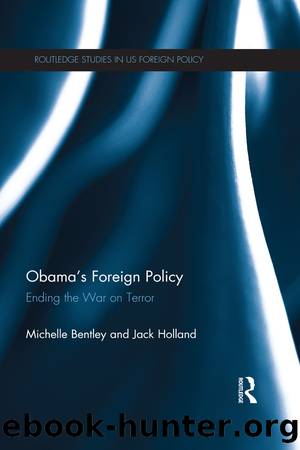The Obama Doctrine: A Legacy of Continuity in Us Foreign Policy? by Michelle Bentley & Jack Holland

Author:Michelle Bentley & Jack Holland [Bentley, Michelle & Holland, Jack]
Language: eng
Format: epub
ISBN: 9780367281618
Google: 3sZRwwEACAAJ
Goodreads: 44640470
Publisher: Routledge
Published: 2019-07-29T00:00:00+00:00
Escaping policies
For many, Obamaâs first administration was anti-climatic. For those who anticipated that he would bring about a major change in US foreign policy â âchange we can believe inâ â the extensive continuity in approach has not lived up to expectations. Obama was supposed to have been an antidote to everything that had been unacceptable about Bush and the way the American response to 9/11 had been constructed. Consequently, the subsequent identification of significant similarities in policy has been a source of frustration and disappointment, not least where Obama has actually expanded controversial policies such as drone attacks. The reasons for continuity have already been debated within other chapters in this volume. But whatever the explanation, it is clear that any shift has been far from transformative. Within this context then, and to the extent that comparable policies were adopted, it is perhaps unsurprising that the same narratives used to express them in the past would also be employed.
At one level this could be seen as the realisation of Obamaâs self-interest. Given that these narratives were already successfully linked to these policies, why not derive the same political benefit by continuing to utilise them? At another level, however, this can be viewed as a situation of rhetorical ensnarement: that in continuing to adhere to policies â specifically policies created within, and because of, the discursive construct of the âWar on Terrorâ â this would necessitate a commitment to any underpinning narrative. Indeed, it has already been noted how intrinsically linked action and rhetoric have been in respect of the âWar on Terrorâ. For example, the way in which the discursive framework of âwarâ and actual military action in Iraq were mutually reinforcing. Consequently, these two aspects were so fundamentally co-dependent that attempting to separate out any part of this for removal would have been extremely problematic.
The most evident example of this is raised by Jackson and relates to Obamaâs attempts to close Guantanamo Bay. On entering the White House, one of Obamaâs first commitments was to shut the controversial facility. Yet Gitmo is still very much open for business. Various legal factors prevented Obama realising this ambition; not least where closure would raise serious questions as to where/how detainees should be transferred and, critically, tried (a situation complicated further by Congressâ refusal to finance alternative facilities or trials). In this situation, closing Guantanamo threatened to open a Pandoraâs Box; it was easier to keep the lid on. In doing so, however, this raised a different question as to how to justify the continued detention of prisoners at the unit. Detention had been achieved under Bush through the legal classification of prisoners as âunlawful enemy combatantsâ. This allowed âsuspect terroristsâ to âbe detained in accordance with the âlaws and customs of war,â which would mean they have no rights as criminal detainees or, for that matter, as civil detainees under the U.S. Constitutionâ (Kanstroom 2003: 18â19). Within this context, terrorists could be defined as enemy combatants within that conflict, specifically
Download
This site does not store any files on its server. We only index and link to content provided by other sites. Please contact the content providers to delete copyright contents if any and email us, we'll remove relevant links or contents immediately.
The Secret History by Donna Tartt(19053)
The Social Justice Warrior Handbook by Lisa De Pasquale(12187)
Thirteen Reasons Why by Jay Asher(8893)
This Is How You Lose Her by Junot Diaz(6877)
Weapons of Math Destruction by Cathy O'Neil(6265)
Zero to One by Peter Thiel(5787)
Beartown by Fredrik Backman(5737)
The Myth of the Strong Leader by Archie Brown(5500)
The Fire Next Time by James Baldwin(5431)
How Democracies Die by Steven Levitsky & Daniel Ziblatt(5215)
Promise Me, Dad by Joe Biden(5141)
Stone's Rules by Roger Stone(5081)
A Higher Loyalty: Truth, Lies, and Leadership by James Comey(4954)
100 Deadly Skills by Clint Emerson(4921)
Rise and Kill First by Ronen Bergman(4780)
Secrecy World by Jake Bernstein(4741)
The David Icke Guide to the Global Conspiracy (and how to end it) by David Icke(4709)
The Farm by Tom Rob Smith(4502)
The Doomsday Machine by Daniel Ellsberg(4484)
